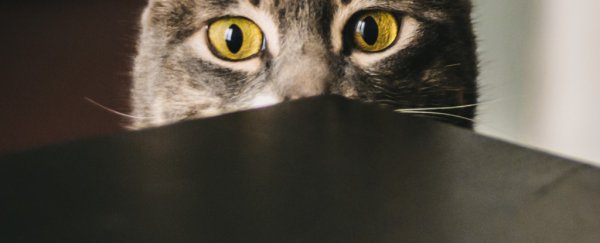We already know that cats can be as neurotic as their owners are, but just how deep are the personality ties between felines and the humans who look after them?
Pretty deep, according to new research from scientists in the UK, who found that personality traits of cat owners correlated with related behaviours exhibited by their pets – suggesting that, to some extent, your cat might be absorbing and mirroring aspects of your own personality.
"Many owners consider their pets as a family member, forming close social bonds with them," animal welfare researcher Lauren Finka from Nottingham Trent University explained to The Telegraph.
"It's therefore very possible that pets could be affected by the way we interact with and manage them, and that both these factors are in turn influenced by our personality differences."
Finka and her team surveyed over 3,000 cat owners, asking a series of questions that measured them on a scale known as the Big Five Inventory (BFI) of personality traits, which assesses people's agreeableness, conscientiousness, extroversion, neuroticism, and openness.
What they found was a number of correlations that not only predicted the cat's general welfare, but also its own personality.
For example, higher owner neuroticism was linked with cats cited as having a "behavioural problem", which could be evidenced by aggression, anxiety or fear, or stress-related behaviours – in addition to medical conditions or being overweight.
We've seen that kind of association demonstrated in previous research, but that's not all.
The researchers also found that cat owners who scored higher on extroversion were more likely to have animals that themselves enjoyed more freedom outside, while participants who came across as agreeable reported being more satisfied with their (perhaps more agreeable) felines.
Of course, as we well know, correlation does not equal causation, but the researchers think there could be something like that going on here – although it will take more studies like this one to elaborate on the link.
"The majority of owners want to provide the best care for their cats, and these results highlight an important relationship between our personalities and the wellbeing of our pets," said Finka.
"Further research is needed to investigate the causal nature of this relationship – and to look at if, and how, owner personalities are directly influencing their cat's behaviour and welfare."
Really, the findings are less surprising than you might think at first. People who love cats often treat them like a human member of the family; children often come to take on behavioural forms exhibited by their parents, so too, hypothetically, might cats.
"Cats are a mini-me," feline medicine researcher Danielle Gunn-Moore from the University of Edinburgh, who wasn't involved with the study, told The Times.
"They are sentient creatures strongly affected by the people around them. They are intimately bonded with their owners and they have an effect on each other."
What's important for us to remember in this beguiling association is that it's not just about cat personalities – it's also about their welfare.
How we treat these tiny, fascinating animals has a demonstrated impact on their physiological and psychological health, in ways we ourselves might not even be conscious of.
We need to become more aware of how this link works if we want the best for our feline friends.
"Cats may not always find living as our pets easy," Finka told PsyPost, "and it's important that we are aware of how our behaviour may be impacting upon them, in both positive and negative ways."
The findings are reported in PLOS One.
